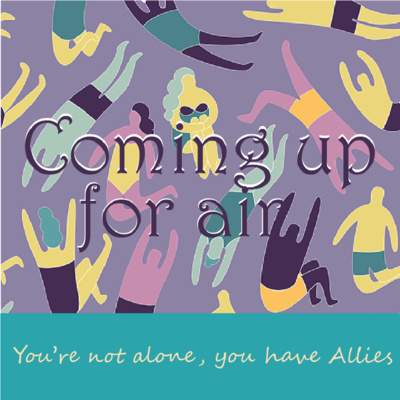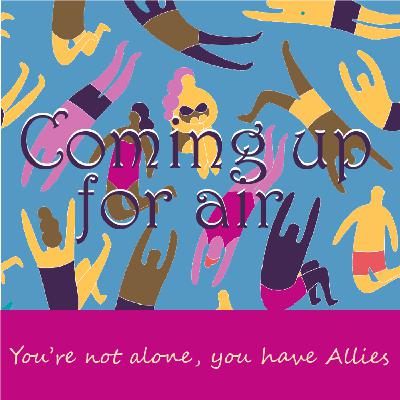Discover Coming Up for Air — A Toolkit to Help with Your Loved One's Recovery from Addiction & Mental Illness
Coming Up for Air — A Toolkit to Help with Your Loved One's Recovery from Addiction & Mental Illness

Coming Up for Air — A Toolkit to Help with Your Loved One's Recovery from Addiction & Mental Illness
Author: Allies in Recovery
Subscribed: 86Played: 1,812Subscribe
Share
© Allies in Recovery
Description
This podcast is comprised of three series addressing topics relevant to families dealing with a loved one's addiction:
- FAMILIES SPEAK: parents share wisdom, tools & experience using CRAFT (a proven method) with their loved one
- Partner CRAFT: co-hosts explore the specificity of using CRAFT with a romantic partner (or ex)
- VOICES from the FRONT LINES: Guests share expertise and stories
Allies in Recovery provides online learning modules, expert hand-tailored guidance, CRAFT support groups, info on treatment options, and much more.
Learn about membership options on alliesinrecovery.net
- FAMILIES SPEAK: parents share wisdom, tools & experience using CRAFT (a proven method) with their loved one
- Partner CRAFT: co-hosts explore the specificity of using CRAFT with a romantic partner (or ex)
- VOICES from the FRONT LINES: Guests share expertise and stories
Allies in Recovery provides online learning modules, expert hand-tailored guidance, CRAFT support groups, info on treatment options, and much more.
Learn about membership options on alliesinrecovery.net
299 Episodes
Reverse
In this closer look at Module 5, you’ll learn a tenet of CRAFT – rewarding positive behavior and removing rewards for negative behavior. When it comes to “using,” the moment-by-moment details become important. Your job is increasing your awareness by witnessing and noticing your loved one’s behavior. “Using” is really a larger term including before, during, and after interacting with a substance. Everything else is “not using.” When there are periods, maybe tiny ones, of not using, move in with gentle, quiet rewards of connection. It’s important, too, to learn how to calm your system enough to do this process. It’s all trial and error, so don’t judge yourself for not doing it right. But do notice how what you’re doing makes an impact. Check out Module 5 for more.
The rest of our interview with Jaclyn Brown, a podcast host and voice for advocacy. In part 1, she discussed losing her brother to addiction. In part 2, she discusses the aftermath, and what she does to create space in her own life for her ongoing grief.
Addiction specialist Dr. Carl Erik Fisher discusses the effects of stress on the body, and shares some mindfulness techniques that are proven effective. Dr. Fisher and our hosts explain how mindfulness can help families in recovery achieve a sense of agency in their lives by allowing them more control over their emotions.The support group that Kayla facilitates is now offered on a sliding scale.Wednesdays at 6:30pm ETEmail kaylacraftgroup@gmail.com to join or learn more(Cost should not be a barrier—please reach out if you're interested)Allies in Recovery's member site is currently "on pause". Learn more here. During this time, we have taken our entire eLearning program out from behind the paywall—the entire library of learning videos is currently available on our youtube channel.
It’s incredibly hard to have a Loved One who’s experiencing homelessness. Our hosts—Hazel, Kevin, and Greer—join Kayla Solomon to discuss their experiences with their Loved Ones and offer hard-won advice. They say it’s important to try to create an environment of openness, connection, and availability—up to a point. But it’s also important to have boundaries. If you’re not giving advice or intervening in ways your Loved One is not asking for, they get the life experience of their choices, but they also have loving connections available. When they’re ready, you’re ready to help them with a list of resources.Our Families Speak series features a wonderful team of people navigating life with an addicted Loved One. They are all members of Allies in Recovery, an online platform providing proven, research-based training, guidance, support and resources for families with a Loved One struggling with substance use. Alongside psychotherapist Kayla Solomon, they openly share their experiences, insights, and the CRAFT-based tools that have helped them shift the dynamic at home. The support group that Kayla facilitates is now offered on a sliding scale.Wednesdays at 6:30pm ETEmail kaylacraftgroup@gmail.com to join or learn more(Cost should not be a barrier—please reach out if you're interested)Allies in Recovery's member site is currently "on pause". Learn more here. During this time, we have taken our entire eLearning program out from behind the paywall—the entire library of learning videos is currently available on our youtube channel.
How do accumulated negative feelings and trauma impact you and your relationship with your loved one? How do you get past them, to a better place? In part, it's about breaking the contract of the usual interactions and cycles—learn to step back, re-assess, and let our loved ones handle things without so much of our intervening. Kayla and Dominique discuss how that can be done.The support group that Kayla facilitates is now offered on a sliding scale.Wednesdays at 6:30pm ETEmail kaylacraftgroup@gmail.com to join or learn more(Cost should not be a barrier—please reach out if you're interested)Allies in Recovery's member site is currently "on pause". Learn more here. During this time, we have taken our entire eLearning program out from behind the paywall—the entire library of learning videos is currently available on our youtube channel.
"This is not just a conflict resolution tool, it's about showing somebody that you're actually interested in what they're talking about," Kayla reminds us.Reflective listening involves two simultaneous mindsets—you're listening, and at the same time reflecting whatever your Loved One says. Our hosts weigh in on good strategies for dealing with the difficulty of inhabiting those simultaneous mindsets, including curiosity, interest, and separation.The support group that Kayla facilitates is now offered on a sliding scale.Wednesdays at 6:30pm ETEmail kaylacraftgroup@gmail.com to join or learn more(Cost should not be a barrier—please reach out if you're interested)Allies in Recovery's member site is currently "on pause". Learn more here. During this time, we have taken our entire eLearning program out from behind the paywall—the entire library of learning videos is currently available on our youtube channel.
Ever felt baffled or enraged by communicating with a loved one? Check out this popular episode from 2021, hosted by Kayla Solomon, Laurie MacDougall, and Isabel Cooney. What is "reflective listening?" How does it work? What are the benefits for you, and the person you're listening to? And why does Kayla believe in it so much that she'd use it if someone were pointing a gun at her?The support group that Kayla facilitates is now offered on a sliding scale.Wednesdays at 6:30pm ETEmail kaylacraftgroup@gmail.com to join or learn more(Cost should not be a barrier—please reach out if you're interested)Allies in Recovery's member site is currently "on pause". Learn more here. During this time, we have taken our entire eLearning program out from behind the paywall—the entire library of learning videos is currently available on our youtube channel.
When your Loved One is coming home, it's time to collaborate and negotiate about expectations and plans. It's important to hear what consequences they suggest for certain actions or inaction, and to keep communicating openly over time. This is a ripe moment to have a talk about the various possibilities and what might occur in the near future. This is a perfect timeto use the leverage you have (they want to come home, they are not currently using substances).The CRAFT model that we teach at alliesinrecovery.net is a therapeutic process that teaches us how to be in relationship. Shift your Loved One's trajectory with substances and recovery by shifting your own patterns.The support group that Kayla facilitates is now offered on a sliding scale.Wednesdays at 6:30pm ETEmail kaylacraftgroup@gmail.com to join or learn more(Cost should not be a barrier—please reach out if you're interested)Allies in Recovery's member site is currently "on pause". Learn more here. During this time, we have taken our entire eLearning program out from behind the paywall—the entire library of learning videos is currently available on our youtube channel.
In part 2, Linda offers tools to help calm the parasympathetic nervous system. As Kayla says, it's part of gaining coherence, a prerequisite for connection. Linda Aber is a mother whose psychology journey deepened when she adopted two children from Russian orphanages. She is an Attachment Parent Coach, Certified Nurtured Heart® Approach Trainer, Certified Theraplay® Group Specialist, Certified HeartMath® Anxiety/Anger Reduction Practitioner and Family Life Educator CCFE. In part 1, she joins our hosts to discuss the parasympathetic nervous system, CRAFT, and parenting.Connect with Linda via Her website and her Facebook.The support group that Kayla facilitates is now offered on a sliding scale.Wednesdays at 6:30pm ETEmail kaylacraftgroup@gmail.com to join or learn more(Cost should not be a barrier—please reach out if you're interested)Allies in Recovery's member site is currently "on pause". Learn more here. During this time, we have taken our entire eLearning program out from behind the paywall—the entire library of learning videos is currently available on our youtube channel.
Linda Aber is a mother whose psychology journey deepened when she adopted two children from Russian orphanages. She is an Attachment Parent Coach, Certified Nurtured Heart® Approach Trainer, Certified Theraplay® Group Specialist, Certified HeartMath® Anxiety/Anger Reduction Practitioner and Family Life Educator CCFE. In part 1, she joins our hosts to discuss the parasympathetic nervous system, CRAFT, and parenting.Connect with Linda via Her website and her Facebook.The support group that Kayla facilitates is now offered on a sliding scale.Wednesdays at 6:30pm ETEmail kaylacraftgroup@gmail.com to join or learn more(Cost should not be a barrier—please reach out if you're interested)Allies in Recovery's member site is currently "on pause". Learn more here. During this time, we have taken our entire eLearning program out from behind the paywall—the entire library of learning videos is currently available on our youtube channel.
If you're forced to have limited contact, it can be hard to handle the unknown. It's important to learn how to be in contact in simple ways, and to calm your system down to respond well and strengthen the connection. Use humor; find ways to connect with who they are and what they like—reminding them of who they are becomes a bridge and connection. If you’re worried, learn how to communicate simply, without accusation or judgement.The support group that Kayla facilitates is now offered on a sliding scale.Wednesdays at 6:30pm ETEmail kaylacraftgroup@gmail.com to join or learn more(Cost should not be a barrier—please reach out if you're interested)Allies in Recovery's member site is currently "on pause". Learn more here. During this time, we have taken our entire eLearning program out from behind the paywall—the entire library of learning videos is currently available on our youtube channel.
We intend to be supportive and helpful and keep our Loved Ones safe. But our words aren’t always perceived that way. It’s important to become more aware of how we’re coming across, and to gain the tools to soften the message, hear when they feel upset, and shift things so that we can go back into connection. The result is building the relationship so things can come out more clearly, and the person can more readily receive our words if they choose to.The support group that Kayla facilitates is now offered on a sliding scale. (Cost should not be a barrier—please reach out if you're interested.) • Wednesdays at 6:30pm ET • Email kaylacraftgroup@gmail.com to join or learn moreAllies in Recovery's member site is currently "on pause." Learn more here. During this time, we have taken our entire eLearning program out from behind the paywall—the entire library of learning videos is currently available on our youtubechannel.
Presume you’ll have moments in a relationship that feel like gigantic rifts, or like uncomfortable separation and disconnect. That’s not a problem, but an opportunity to show that you’re changing and working on your part. Take full responsibility for your part, whether they do or not. Keep doing it over and over, so you become a safe person—the person who’s there when they decide they’re ready for more help.The support group that Kayla facilitates is now offered on a sliding scale. • Wednesdays at 6:30pm ET • Email kaylacraftgroup@gmail.com to join or learn more(Cost should not be a barrier—please reach out if you're interested.)Allies in Recovery's member site is currently "on pause". Learn more here. During this time, we have taken our entire eLearning program out from behind the paywall—the entire library of learning videos is currently available on our youtube channel.
Kayla asks the Families Speak podcasters to look back at their entire journey. Where did they begin this journey, where are they now, how would they describe their journey, what has changed, what have they learned? The family members who speak to you via the Families Speak series are people on a journey with Loved Ones who struggle with addiction and mental health. Listen to them as they reflect on the up’s, the down’s, and the learning curve of the Love Warriors path they’ve taken. What qualities have they cultivated throughout the journey, and what do we have to learn from them?** The support group that Kayla facilitates is now offered on a sliding scale. • Wednesdays at 6:30pm ET • Email kaylacraftgroup@gmail.com to join or learn more(Cost should not be a barrier— please reach out if you're interested)In our FAMILIES Speak series, psychotherapist Kayla Solomon invites members from the support group she facilitates for Allies in Recovery to share their experiences navigating addiction in the family. These parents have faced similar struggles to so many others—but with Allies in Recovery, they’ve found a new way forward.
Worry is universal, yet it’s also damaging to ourselves and our relationships. Suzanne aptly refers to the “chem trails” we put out when we’re in a state of anxiety-fear-worry. Jody remarks that worrying and the energy it gives off “is the biggest repellent… when I’m in that state, I am sending all the wrong signals out… .” She shares that realizing this was “one of the initial catalysts to say, I really need to work on this.” But how do we unlearn these ingrained habits and behaviors? The Families Speak co-hosts do a deep dive into worrying, and share their experience with worry as the parents of Loved Ones with substance use and mental health struggles. Hear how CRAFT helped them put new patterns into place.Read Isabel's 2018 post entitled "Does Worry Prove I Love You." https://alliesinrecovery.net/does-worrying-prove-i-love-you/** Starting in August of 2025, the support group that Kayla facilitates will be offered on a sliding scale.Wednesdays at 6:30pm ETEmail kaylacraftgroup@gmail.com to join or learn more(Cost should not be a barrier— please reach out if you're interested) **In our FAMILIES Speak series, psychotherapist Kayla Solomon invites members from the support group she facilitates for Allies in Recovery to share their experiences navigating addiction in the family. These parents have faced similar struggles to so many others—but with Allies in Recovery, they’ve found a new way forward.A membership at Allies in Recovery provides: ✔ A structured online platform to learn CRAFT skills step by step ✔ Support groups and a community that truly understands ✔ A Q&A blog with expert advice ✔ And much more! Start today—visit Allies in Recovery to begin creating change in your family.
Are you a "YES person" or a "NO person?" According to Kayla, each of us has a tendency in one direction or the other. Find out what practice she recommends for "YES people" and why. But why is it so hard for so many of us to say "no" to people we love? Bridget, one of our co-hosts, admits that in her relationship with her Loved One, she used to operate from a place of fear. "I thought if I said 'no', I'd never see him again." Join us for a pertinent exploration of a laden subject. "YES" and "NO" often happen automatically for us, but what would start to shift for the better if we became more mindful of why we're answering that way?The support group that Kayla facilitates is now offered on a sliding scale.Wednesdays at 6:30pm ETEmail kaylacraftgroup@gmail.com to join or learn more(Cost should not be a barrier— please reach out if you're interested)In our FAMILIES Speak series, psychotherapist Kayla Solomon invites members from the support group she facilitates for Allies in Recovery to share their experiences navigating addiction in the family. These parents have faced similar struggles to so many others—but with Allies in Recovery, they’ve found a new way forward.
This topic came up organically when we came together to record and most of the team admitted they were in a strange place. We decided to explore just that – those moments when you realize you’re just not on your game (feeling off, disconnected, out of it, tired, not quite right… know what I mean?). Whether the cause is related to your Loved One’s substance use or mental health struggles, or any other stressor, how do you identify what you’re feeling, and move into a more balanced place? As always, the Families Speak team dives deep and shares in a generous, wise and pertinent manner.The support group that Kayla facilitates is now offered on a sliding scale.Wednesdays at 6:30pm ETEmail kaylacraftgroup@gmail.com to join or learn more(Cost should not be a barrier— please reach out if you're interested)In our FAMILIES Speak series, psychotherapist Kayla Solomon invites members from the support group she facilitates for Allies in Recovery to share their experiences navigating addiction in the family. These parents have faced similar struggles to so many others—but with Allies in Recovery, they’ve found a new way forward.
Words are important. But what may be even more important than words is the energy behind them. How do our body language, the tone of our voice, the thoughts we’re thinking, the feelings we’re feeling, and what we’re grappling with in any moment, affect things with others around us, for example with our Loved One? As we reorient and become more aware of our energy, it’s astounding what we’re able to heal in our relationships. Learn some simple ways to diffuse the tension and clean up your side of the street.** Starting in August of 2025, the support group that Kayla facilitates will be offered on a sliding scale.Wednesdays at 6:30pm ETEmail kaylacraftgroup@gmail.com to join or learn more(Cost should not be a barrier— please reach out if you're interested) **In our FAMILIES Speak series, psychotherapist Kayla Solomon invites members from the support group she facilitates for Allies in Recovery to share their experiences navigating addiction in the family. These parents have faced similar struggles to so many others—but with Allies in Recovery, they’ve found a new way forward.A membership at Allies in Recovery provides: ✔ A structured online platform to learn CRAFT skills step by step ✔ Support groups and a community that truly understands ✔ A Q&A blog with expert advice ✔ And much more! Start today—visit Allies in Recovery to begin creating change in your family.
A message from Isabel Cooney about some podcast changes.** Starting in August, the support group that Kayla facilitates will be offered on a sliding scale.Wednesdays at 6:30pm ETEmail kaylacraftgroup@gmail.com to join or learn more(Cost should not be a barrier— please reach out if you're interested) **At Allies in Recovery, we know that change starts with us. When we learn to self-regulate, it transforms our relationships with our Loved Ones struggling with addiction. Visit Allies in Recovery to start your new path towards healing addiction in your family.
“Humor is a release,” insists Kayla Solomon. If you can laugh, the perceived danger dissipates. Co-host Suzanne shares, “Even in the face of total darkness, we can laugh at the insanity. I think the line between humor and tragedy is very, very fine indeed.”In this lighthearted episode, our team offers deep thoughts about humor, including how to access it… as well as some unexpected tips such as co-host Elizabeth’s “viking horns” recommendation. Find out which caveat Kayla warns about as you pursue your quest to bring more humor into your world.Starting in August, the support group that Kayla facilitates will be offered on a sliding scale.Wednesdays at 6:30pm ETEmail kaylacraftgroup@gmail.com to join or learn more(Cost should not be a barrier— please reach out if you're interested)In our FAMILIES Speak series, psychotherapist Kayla Solomon invites members from the support group she facilitates for Allies in Recovery to share their experiences navigating addiction in the family. These parents have faced similar struggles to so many others—but with Allies in Recovery, they’ve found a new way forward.















